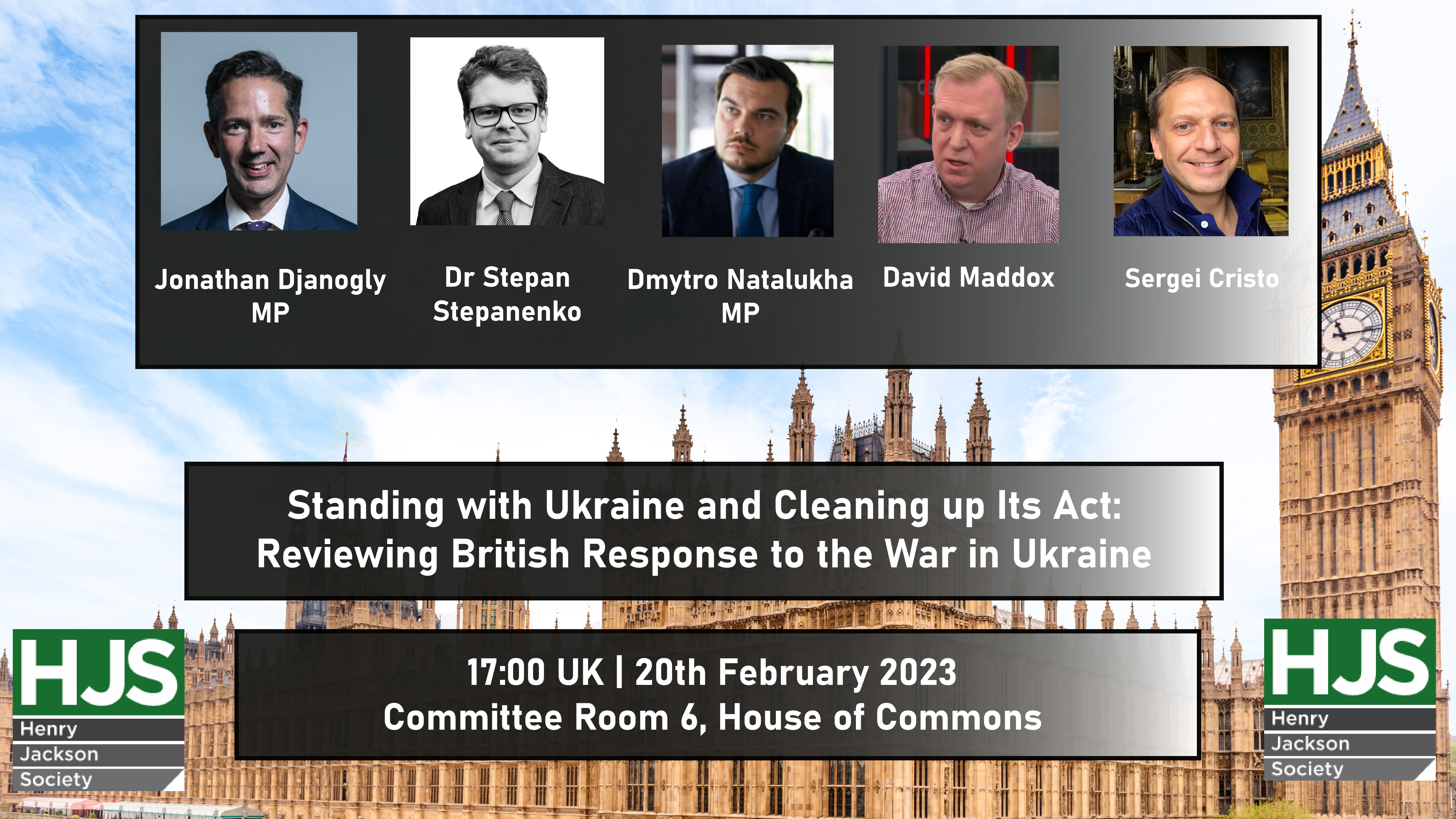Standing with Ukraine and Cleaning up Its Act: Reviewing the British Response to the War in Ukraine

- This event has passed.
Standing with Ukraine and Cleaning up Its Act: Reviewing the British Response to the War in Ukraine
20th February 2023 @ 5:00 pm - 6:00 pm

The war in Ukraine has made its mark on the world and European history, comparable to that of the Second World War. With over 7 million people displaced within Europe and many more displaced internally, within Ukraine, together with the utter destruction of Ukrainian civilian infrastructure caused by the Russian army, the cost of the war, notwithstanding the immeasurable cost of those murdered and injured by Russia, is into the trillions of dollars.
The British response and assistance to Ukraine was immediate and far greater than that of other European allies, yet as the war enters a new year, it is timely to consider its impact on the UK.
Financially, Britain has provided monetary and military support, together with humanitarian efforts to aid Ukrainians. As the war approaches its second year, it is worth remembering why everyone is paying to assist Ukraine to victory over Russia. Moreover, it is necessary to remind ourselves that this victory is achievable and what it can look like.
With a high cost of standing up against the Russian aggression, there have also been positive effects on the UK’s political and financial sectors. British politics has become cleaner, with Russian financial influence limited, and support for Ukraine sending those potentially corrupted by Russian influence to the dustbin of history. The UK’s financial system, too, has become more streamlined, with less room for money laundering practices.
The panel will discuss these and other factors in which the UK has become a more transparent democracy as a result of the war in Ukraine.
By kind invitation of Jonathan Djanogly MP, The Henry Jackson Society welcomes you to consider the immediate cost of the war in Ukraine, and the long term political and financial benefits of ridding Britain of the influence of aggressor states, as well as remembering the value of a moral stand against those committing crimes against humanity.

Sergei Cristo has been a Conservative Party activist on the fundraising side for over 20 years. After studying media theory at the University of London and working as a BBC journalist in 1990s, he joined the Conservative Party shortly after Putin came to power in Russia in 2000.
Working as a specialist writer in asset management, Sergei helped the Party to attract young professionals, who had the potential of becoming financial donors in the future. For many years, he volunteered for the Treasurers’ Department as committee member and Vice Chairman of Fastrack Donor Club. Later he continued to assist Party’s fundraising efforts as Committee Member and Vice Chairman of the Carlton Club Political Committee, for about 14 years.
In 2012, he came to prominence after exposing the Russian Government as being the main backer of Conservative Friends of Russia. Just before Brexit, he left the UK to live and work in France.

David Maddox is the Political Editor of Express.co.uk, having previously served in the same role for the Sunday Express print edition. He’s also previously worked at the Scotsman, Aberdeen Evening Express, Portsmouth News & Stratford Herald.

Dmytro Natalukha is a Ukrainian MP, Chair of the Economic affairs committee, member of Ukraine’s delegation to the Parliamentary Assembly of the Council of Europe and co-Chair of the UA-UK Inter-Parliamentary Friendship Group.
He obtained a graduate degree in MPhil in International Relations and Politics at Cambridge University. He also got both Bachelor’s and Master’s degrees in law from the Institute of International Relations of Taras Shevchenko National University of Kyiv.
Before being elected as an MP, Dmytro worked in leading Ukrainian and international law firms “Spenser & Kauffmann,” “Ilyashev and Partners,” and “Baker & McKenzie,” where he specialized in international investments, banking, and finance, as well as litigation.
Dmytro assisted the office of Deputy Country Director of “Right to Protection,” an implementing partner of UNHCR, where he worked with IDPs. He was also the Head of the Lymansky district state administration of the Odesa region and a managing partner of “Lead/Augury,” a strategic communications boutique firm specializing in government relations, public relations, crisis communications, and branding and political consulting.
In 2021 Dmytro was listed as one of the “100 most influential Ukrainians in 2021” and one of the “100 most promising Ukrainian politicians in 2021”. He is fluent in English, Italian, and French languages.

Dr Stepan Stepanenko received his BA (Hons) and MA by research from the University of York and went on to complete a PhD at Ecole Pratique des Hautes Etudes of Paris Sciences et Lettres with a focus on Ukraine. In his academic career Stepan presented at a multitude of academic conferences and authored publications in peer reviewed journals, individually and in collaboration. He is also currently an Associate Member of the CNRS UMR 8167.
In British politics, Stepan has worked with the Conservative Party, running for election in the London Borough of Barnet in 2014 and co-founding the Conservative Friends of Ukraine in 2021. He continues to work on cross party humanitarian projects with a focus on Ukraine.

Jonathan Djanogly MP is the Member of Parliament for the Huntingdon constituency, where he was first elected in 2001 and succeeded former Prime Minister John Major. A lawyer by profession, he previously served as Shadow Solicitor General and Parliamentary Under-Secretary of State at the Ministry of Justice.
Long taking an interest in foreign affairs, particularly in the Black Sea region, Mr Djanogly currently serves as Vice Chair of the All-Party Parliamentary Group on Ukraine and led the first parliamentary delegation to Ukraine following the full-scale invasion in February 2022. In recent months, he has also been one of the leading advocates in Parliament for using confiscated Russian assets to rebuild post-war Ukraine.
***
EVENT SUMMARY
The Henry Jackson Society was pleased to be a part of the discussion in the House of Lords on the war in Ukraine and the British response to it one year into the invasion. Jonathan Djanogly began the forum by inviting the speakers to comment on the state of the war. Dmytro Natalukha started the discussion by lauding the relationship between Britain and Ukraine as its first and strongest ally over the course of the war. He then expressed concern that essential material aid to the conflict is being withheld over indecisiveness and overcautiousness by Western powers. David Maddox argued that even as Ukraine’s most dependable partner in the conflict Britain is hamstrung by political indecision and a lack of military preparedness which could only incentivize other European powers to seek a deal with Russia and betray Ukrainian territorial integrity. Sergei Cristo argued that the brutality of the war has forced Britain to acknowledge the corrosive influence of illicit Russian money in public life and that the invasion provided an opportunity to establish effective oversight of this spending. The panelists agreed that the invasion represented a final red line for Western Europe and that nothing short of victory for Ukraine and the restitution of its internationally recognized borders could end the conflict. The forum agreed that the time for appeasement has long passed, and that only through military defeat and economic isolation will Russian aggression end. The speakers agreed that the invasion has been catastrophic for Russia and that Ukrainian victory is not only necessary, but possible if it is provided with sufficient material and support.
RELATED EVENTS
Israel Crisis Update: The Changing Threat from Iran
Iran’s recent attack against Israel saw it launching cruise and ballistic missiles as well as drones from its own soil, rather than relying on proxy forces. How should we understand the … Continued



